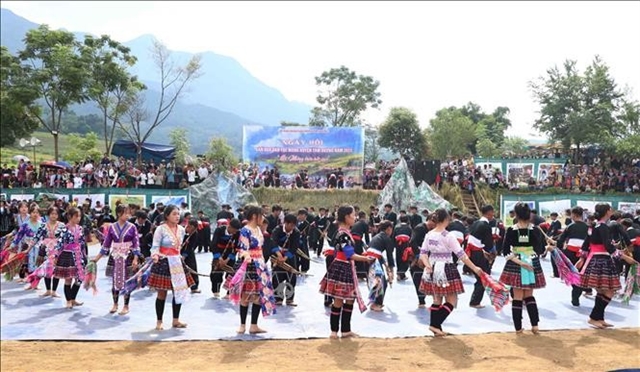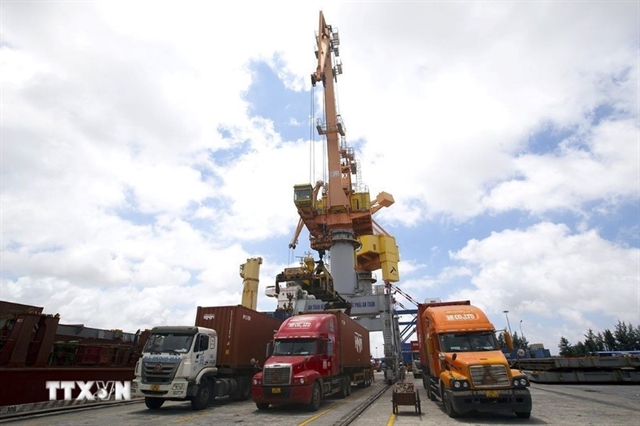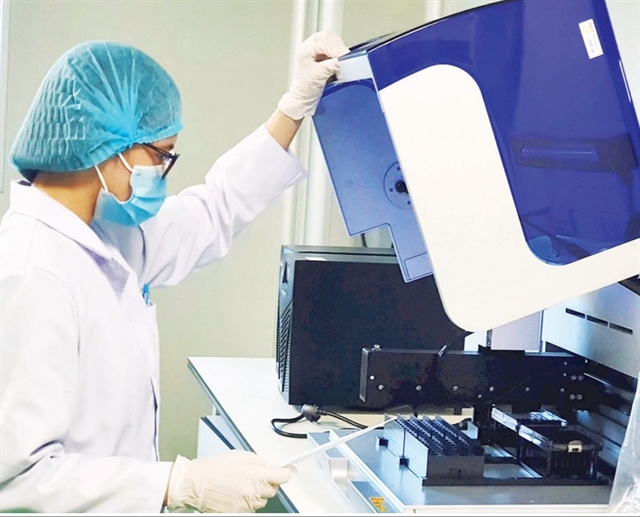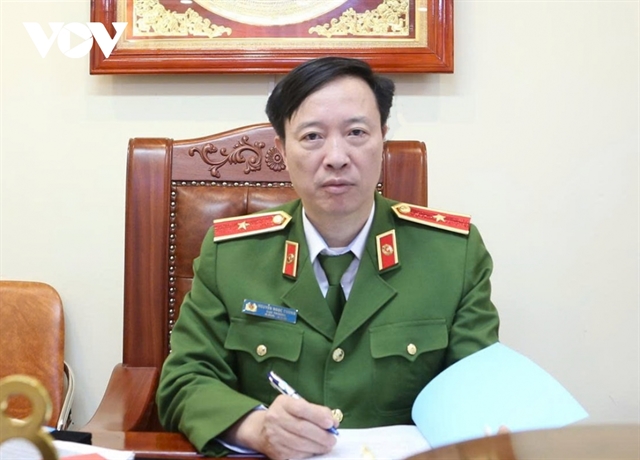 Opinion
Opinion
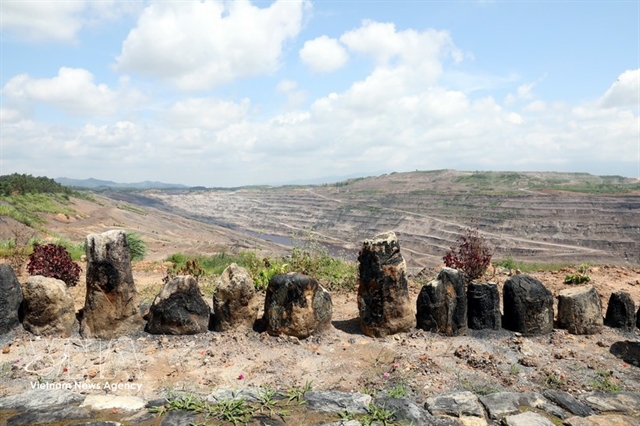
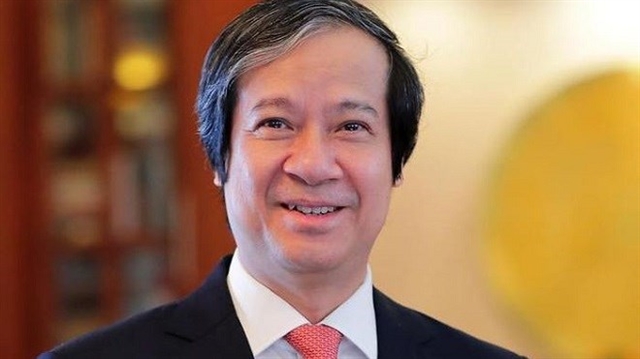 |
| Minister of Education and Training Nguyễn Kim Sơn. — VNA/VNS Photo |
On the occasion of Vietnamese Teachers' Day on November 20, Minister of Education and Training Nguyễn Kim Sơn spoke to the Vietnam News Agency about the quality of teaching staff and strategies to encourage teachers' wholehearted commitment to the profession while attracting young talent to the pedagogical sector.
In the realm of educational innovation, teachers stand as the pivotal force that dictates the success or failure of initiatives. How do you assess the quality of the teaching staff in Việt Nam currently?
Currently, there is an unprecedented influx of teachers in terms of quantity, structure, and scale in the education sector, encompassing both the direct teaching and administrative staff.
While acknowledging the persistent shortage of teachers, it is important to contextualise this scarcity within the broader goal of advancing education, enhancing quality, and meeting the escalating demand for educators to accommodate the growing number of students and children. Relative to past years, the current period witnesses a robust and substantial teacher force, representing the sector's most invaluable capital and a paramount asset for fulfilling the mandates set forth by the Party and State.
In the contemporary landscape, teachers undergo more comprehensive training than in preceding periods – both domestically and internationally. This includes proficiency in professional qualifications, pedagogical methodologies, and exposure to the latest educational sciences and teaching methods of the era. Notably, the percentage of university lecturers trained abroad and the number of individuals with doctoral degrees have witnessed a significant upswing.
In recent years, there has been a noticeable increase in the presence of non-public schools, spanning from kindergarten to university levels. This expansion introduces new dynamics, augmenting the teaching force and reflecting investments from diverse stakeholders.
The 2019 Law on Education emphasises the imperative of elevating standards and imposing more stringent requirements for enhancing the qualifications of teachers. While this presents a certain degree of pressure, it concurrently serves as a driving force, motivating teachers to enhance their qualifications in line with the heightened demands of today's educational landscape, fostering innovation and elevating overall educational quality.
In general, the teaching force as a whole continues to embody the spirit, quality, and enthusiasm characteristic of traditional educators. With over 1.6 million teachers demonstrating unwavering dedication to their profession and the noble cause of education, they actively surmount obstacles and challenges to nurture a profound love for teaching and to care for successive generations of students. The teaching force consistently showcases creativity, a commitment to self-study, self-improvement, and an ability to adapt to the demands of the Fourth Industrial Revolution, ensuring the effective fulfilment of their responsibilities.
Within the teaching community, numerous instances exemplify the resilience displayed in overcoming adversities to reach individuals in remote and disadvantaged areas. The enduring virtues and strengths, inherited from tradition and perpetuated to the present day, instil a deep sense of confidence and pride. Confronting the evolving expectations of the Party, State, and the public in enhancing the quality of education and training, and furnishing high-quality human resources for national development, I am confident that the teaching force will persist in their efforts and successfully accomplish their mission.
The entire education sector confronts formidable challenges – those of development and the pressures of innovation. However, such challenges and pressures also serve as opportunities for teachers to further innovate, evolve, and mature.
In recent times, while there has been increased attention from the Party and State towards incentives, rewards, and support for teachers, there are still lingering shortcomings that leave educators less than fully confident in their profession. What solutions do you propose to address and rectify this issue?
In the pursuit of innovation, the teaching staff is advocating for additional policies to ensure a more sustainable livelihood, especially for new and young teachers. There is a particular emphasis on the need for policies that alleviate challenges faced by teachers in mountainous, island, and remote areas, where many educators operate.
The reality is that in these regions, public housing may be lacking, schools are not yet fully established, and teachers are tasked with instructing multi-level classes. Teachers are calling for improved facilities and infrastructure for educational development, including more secure and solidified schools, better living conditions, and increased public housing. Such enhancements would not only ease the challenges for teachers but also create a more conducive environment for both educators and students, thereby enhancing the effectiveness of the reform process and increasing teacher engagement.
While stories of strength and sacrifice are acknowledged and respected, it is imperative to strive for optimal conditions. Even in locations not currently facing significant difficulties, ensuring essential physical conditions, such as well-equipped subject classrooms and facilities for teaching and learning, necessitates ongoing attention. As the demand for high-quality education increases, there is a pressing need to elevate the standards for schools and classes, a priority that will be urgently addressed in the times ahead.
Reflecting on the thoughts conveyed through more than 6,300 questions received during my interactions with teachers at the beginning of the school year, it is evident that educators harbour a collective hope for increased societal understanding and support. Teachers express a desire for greater sharing and comprehension from society, parents, and the community at large.
Recognising the formidable nature of the innovation underway in the education sector, teachers emphasise that this transformative work, being novel and challenging, necessitates not only the dedicated efforts of the teaching staff but also widespread sharing, companionship, support, and understanding, particularly from parents involved in the education of their children.
In the journey of educational innovation, even small strides require the collective support and understanding of society. Teachers face the challenge of not only adapting to new methodologies but also contending with societal judgments that may not always accurately reflect the depth of their dedication and exertions.
It is important to underscore that schools are integral components of the community, representing not only entities subject to supervision but also institutions that thrive through community involvement, support, and collaboration.
Regarding the issue of attracting young, talented individuals into the field of education, what policies are envisioned beyond the reinforcement of existing measures to retain teachers in the profession?
The overarching goal of the education sector is to cultivate high-quality education, thereby contributing to the development of high-quality human resources for the nation. Achieving this objective necessitates a concerted effort to attract a diverse pool of young and talented individuals to pursue pedagogy.
For individuals aspiring to undertake the pedagogical exam, a myriad of considerations come into play, with life factors consistently standing out as the initial determinant. Similar challenges are faced by those pursuing teaching careers abroad. While teaching may not be a lucrative profession in terms of salary and income, it is imperative that it ensures a standard of living that allows individuals to sustain themselves through their chosen profession.
In order to attract and support exemplary students to pursue pedagogy, a policy is essential to incentivise their enrollment in pedagogical universities. This can be achieved through the allocation of enrollment orders and provision of living support.
The Ministry of Education and Training has already recommended the issuance of Decree No. 116/2020/NĐ-CP, outlining policies to support tuition payments and living expenses for pedagogical students. Although there has been improvement since the implementation of Decree 116, challenges persist in local support for living expenses and enrollment order implementation. Consequently, the ministry is actively advising the Government on amending Decree 116 with the aim of attracting even more talented individuals to the field of pedagogy.
Another crucial aspect is cultivating a perception of the teaching profession as a truly glorious and noble pursuit, where passionate individuals can assert themselves and garner recognition. Schools undergoing innovation must adapt their working environments to incorporate democratic elements, enabling teachers to participate in activities that foster creativity, effective self-expression, and ongoing support.
While numerous factors contribute to the attractiveness of the teaching profession, the key lies in providing an environment where teachers can develop, assert themselves, lead fulfilling lives, and enhance their capabilities. This, in turn, will naturally attract more capable and qualified individuals. Particularly in higher education, the ability to attract talented individuals for training and development into a cadre of experts and leading scientists is crucial for establishing a robust scientific foundation and a competitive higher education system in a global context. Therefore, a mechanism must be in place to identify and nurture talents in the realms of education, science, and technology.
On the occasion of celebrating Vietnamese Teachers' Day on November 20, what message do you want to convey to teachers across the country?
Teaching is a noble profession laden with numerous challenges and difficulties. No glory comes without its share of weight and trials. It is imperative for every teacher to recognise the profound responsibility that accompanies their role. Each teacher must acknowledge their role as both a creative and selfless individual engaged in noble work. It is the duty of teachers to demonstrate that the journey of development is intertwined with the fulfilment and joy derived from this honourable profession.
Teachers serve as guides, shaping individuals with independent thinking, and fostering commitment to the bright aspirations of the individual, the country, and humanity. This sacred duty lies at the core of the teaching profession.
The Ministry of Education and Training remains committed to advocating and collaborating with various ministries and branches to enhance preferential allowances, explore avenues to augment teachers' income, and devise strategies to fortify facilities and improve working conditions. Despite prevailing challenges, we encourage each teacher to persevere, upholding the glory of the profession and continuing to overcome obstacles with unwavering dedication to fostering excellence in teaching and learning. — VNS

